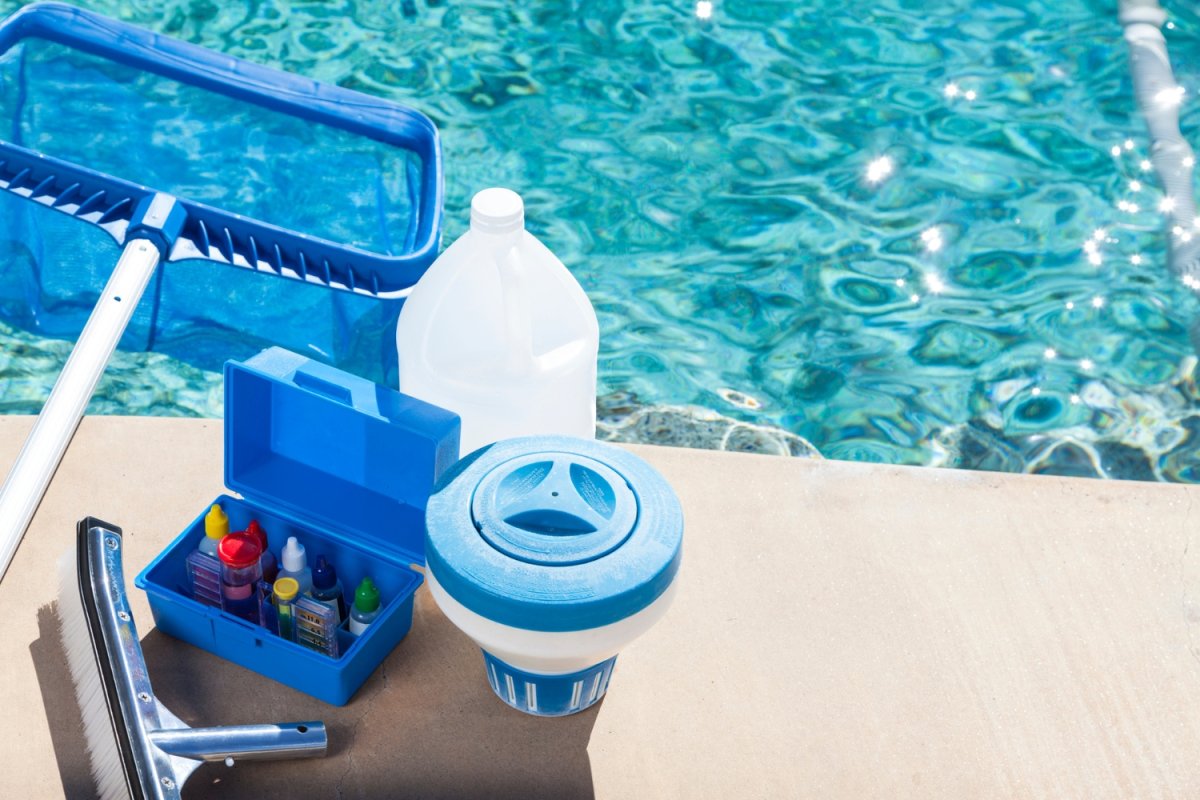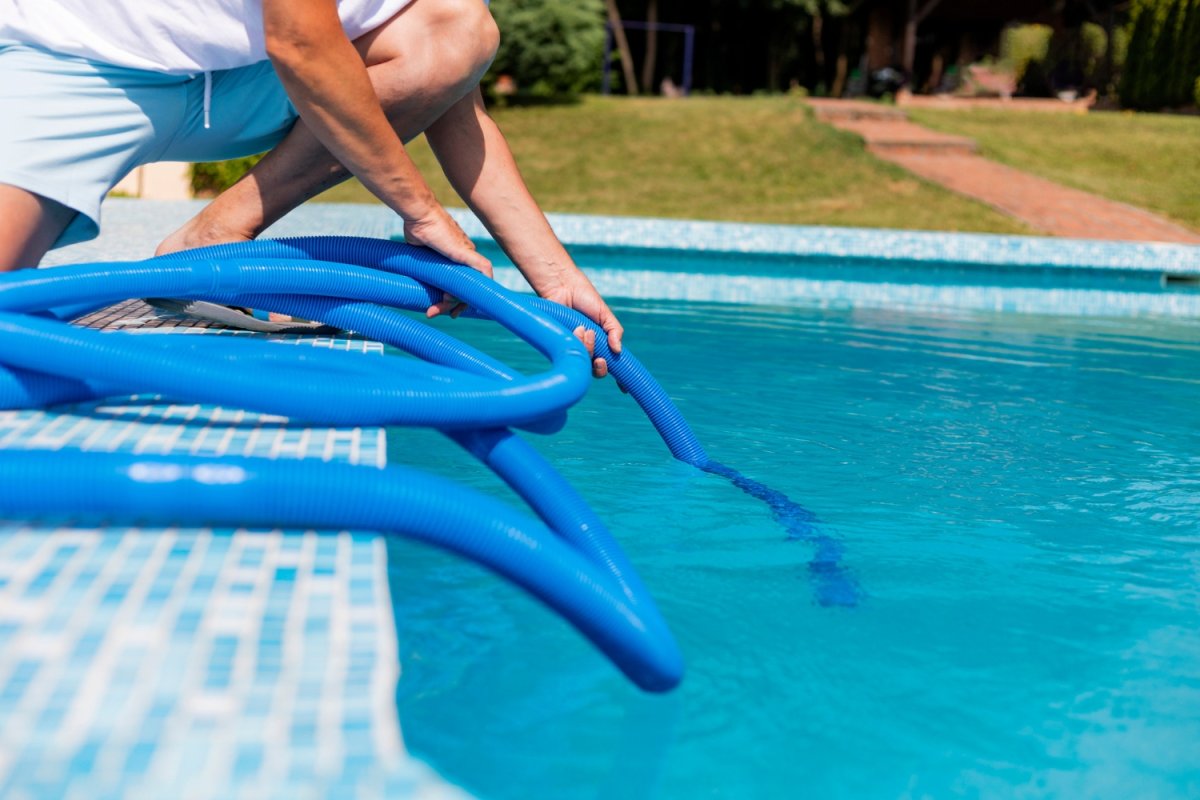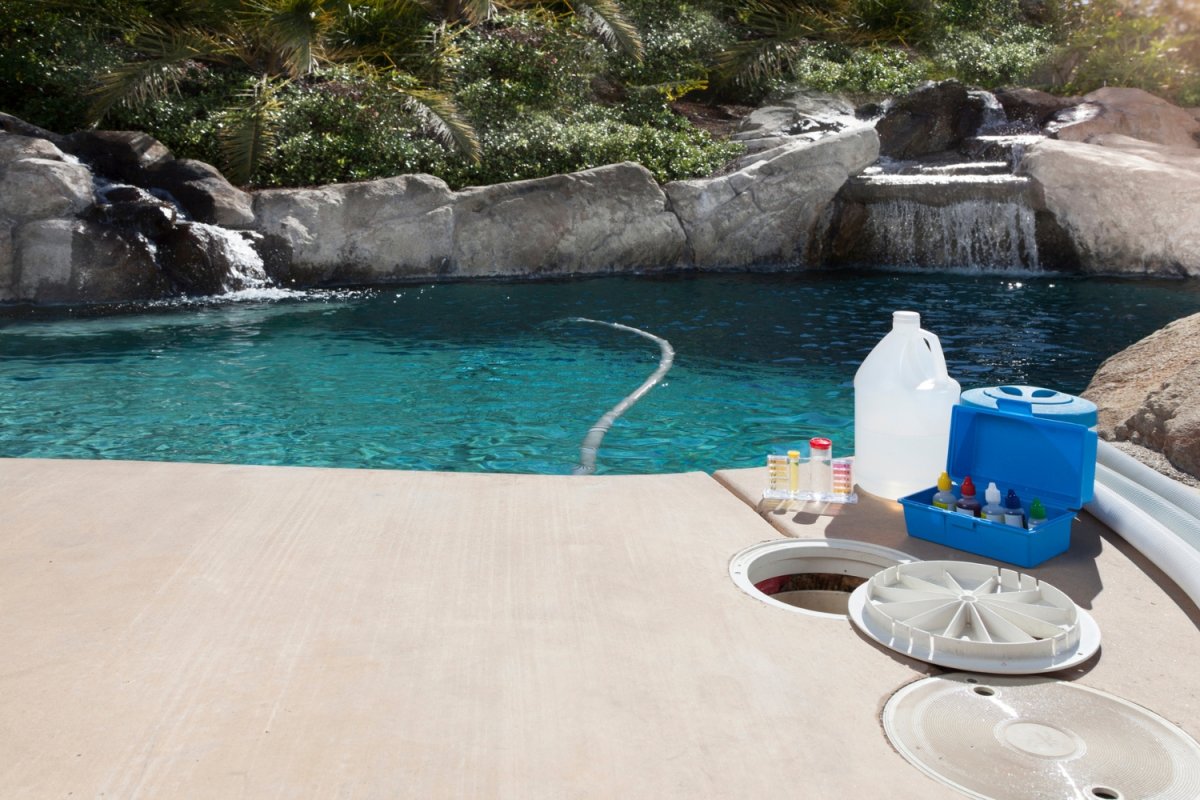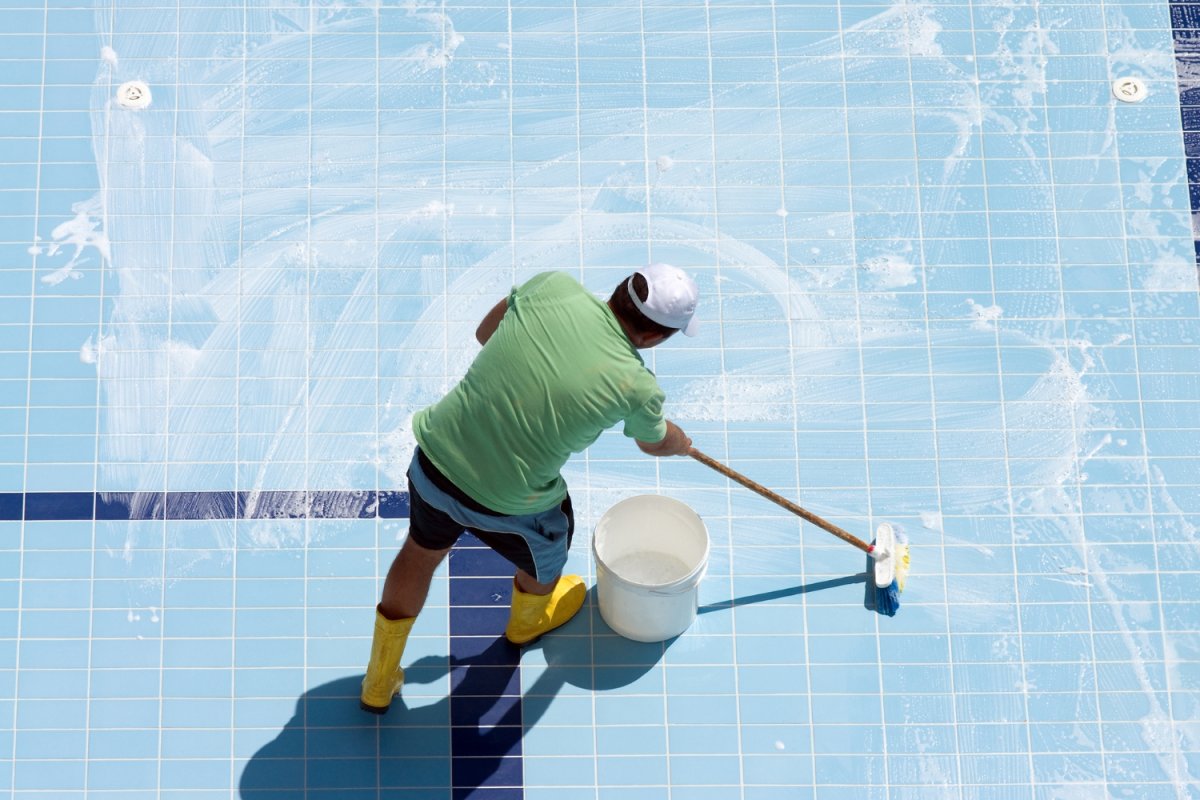We may earn revenue from the products available on this page and participate in affiliate programs. Learn More ›
A rippling pool catching glints of sunlight on a warm afternoon is many homeowners’ dream, but pool owners know that keeping a pool clean is no small feat. There aren’t many homeowners who want to spend an hour skimming, scrubbing, and adjusting chemicals before they can step into the water—that level of effort ruins the whole relaxation vibe. That’s why many homeowners prefer to hire a pool cleaner to do weekly or monthly maintenance. While homeowners may still need to do some basic maintenance, the tough stuff is handled by a professional.
This demand means that the market for pool maintenance companies is wide open in the warm season, so it’s a great opportunity for small-business entrepreneurs to step in. But how does one start a swimming pool–cleaning service? There are several steps that aspiring entrepreneurs will want to take to make sure their business is well thought out and structured in a way that makes success and profit likely.

STEP 1: Learn the basics of pool cleaning and obtain any necessary certifications to work in the industry.
On the surface, pool cleaning seems pretty basic: some chemicals, some tools, and a little elbow grease. However, it’s important for entrepreneurs to understand that pool cleaning can be hard work; skimming leaves and cleaning the waterline is just the beginning. Cleaning the pool also means cleaning and maintaining the pumps, filters, and skimmers, along with vacuuming the pool bottom and keeping the chemicals balanced. Many pool-cleaning businesses also offer pool opening and closing services in areas where pools can’t remain open year-round.
Entrepreneurs can acquire some of the knowledge required by working at established pool-cleaning companies. Nathan Scribner, managing partner of West Berlin, New Jersey–based Millennial Pool Management, LLC, says that he built his company from scratch having spent years learning on the job. “My partner and I had worked in the pool industry since 15 years of age, beginning as lifeguards, then working our way up the management ladder to become American Red Cross lifeguard instructors, service/repair technicians, and district managers.” Scribner notes that they observed many areas that could be improved in terms of company management and operations, and decided it was time to try their own ideas. “We were in college at the time,” he explains, “and ultimately ended up taking gap years to pursue this endeavor, fortunately never having to look back.” Learning while working for other companies provided much of the training, knowledge, and motivation for Scribner to build a company that now manages the pool facilities in more than 150 communities across New Jersey and the greater Philadelphia area.
Some states require a pool cleaner to obtain a certification to open a business or work as a technician, while others require established and demonstrated knowledge of all things related to pool maintenance. Customers, however, typically like to see certifications; it makes them more certain that their money is going to someone who really knows what they’re doing. Before an entrepreneur gets started, they might want to consider taking an in-person or online course to earn a Certified Pool and Spa Operator (CPO) certification to start. Other possible certifications include the Certified Pool and Spa Maintenance Specialist (CMS), Certified Pool and Spa Service Technician (CST), and Certified Pool and Spa Service Professional (CSP). Each of these will help entrepreneurs with different aspects of running a pool-cleaning business, so it’s a good idea for them to start at the beginning and begin earning the certifications, as some of the more advanced certifications have prerequisites. Working through the certification process will also put entrepreneurs in touch with other pool professionals, creating networking opportunities and resources going forward.

STEP 2: Create a comprehensive business plan.
An entrepreneur might think that starting a pool-cleaning business is as easy as posting a few ads, bidding for jobs, and getting customers. But without a structured business plan, their business is more likely to stay small and make minimal profits.
The difference that a thoughtful, professional pool-cleaning business plan can make when an entrepreneur is starting and growing a business can’t be overstated. First, it forces the business owner to make clear decisions right at the beginning about the parameters and scope of the business they want to build. It also encourages both a short-term plan and a longer-term set of goals. Second, it requires the business owner to research the existing market and find their niche: what pool-cleaning services will be offered, where their specialties will be, and who the target customers will be. Third, it pushes the owner to consider how they’ll market their business, how they’ll price their services, and how they’ll finance the business. An entrepreneur with a solid business plan can eventually grow their company to compete with the best pool cleaning services in their area.
A comprehensive plan for opening a pool-cleaning business begins with a cover page that’s followed by an executive summary highlighting each of the following sections within one coherent description. That’s followed by a detailed business overview delineating the services in general and a specific list of services, along with a pricing strategy. Next comes a market analysis, determining what kind of customers (for example, residential versus commercial) the business will target and a forecast of earnings, followed by an assessment of the current competitors and their earnings. A marketing plan follows, then a description of employee planning and projections. The final section (and probably the most difficult to complete) is the financial projections, including a detailed estimate of start-up costs, expenses, estimated earnings for the first year, and owner salary. Certain aspects of writing a business plan are covered in the certification process, but there are templates and tutorials available online for assistance creating a business plan.
Why write a formal plan at all? Starting a business is a financial risk that includes a lot of time and emotional investment. Having a clear and defined plan can make it easier for an entrepreneur to access financing if necessary. The plan can also help reassure an entrepreneur that they are prepared if the prospect of opening a business suddenly seems overwhelming.

STEP 3: Decide on a business structure and register your pool-cleaning business.
When starting a business, entrepreneurs will need to decide on the type of business structure they want the company to run as. There are several options to consider.
In a sole proprietorship, the business uses the owner’s social security number for registration, financial, and tax purposes. This is the easiest and least expensive way to register a business, but it comes with risks: Because there is no separation between the owner and the business, every other asset the owner possesses (savings, home, property) is at risk in the event of a lawsuit against the company. The owner is liable for any debt the company incurs during the time it’s operational. In a partnership, that risk is shared between two owners, but it remains the same.
Owners can choose to register their pool-cleaning business as a limited liability company (LLC). Here, the business gets its own tax identification number, effectively separating the owner’s personal assets and debts from those belonging to the business. An LLC can be trickier to set up, but through patience or by using one of the best LLC services (such as LegalZoom or Northwest Registered Agent), it can be achieved. Owners can also choose to incorporate their business, but that is usually more appropriate for larger companies.
Once an entrepreneur has chosen the correct structure, they’ll need to register the business with their state and local governments. This will identify the business for legal purposes, and potentially with federal officials, especially if the business will eventually hire employees.
STEP 4: Get the required business licenses and permits required by your local municipality.
When starting a pool-cleaning business, entrepreneurs will need to determine their state and local government’s licensing requirements and research how to get a business license. Each type of business entity has different requirements based on the size of the business and the industry, so it’s important that an entrepreneur check with the city and state in which the business will be located. Entrepreneurs may need to obtain a general business license, a small business license, or a contractor’s license, depending on their state of residence. In addition, some states require additional permits based on the industry. Acquiring a swimming pool license (which is often combined with a spa license) and any necessary permits is mostly a matter of filling out a lot of paperwork and submitting it with an associated fee. Entrepreneurs will need to provide proof of small-business insurance, along with any health or safety certificates required by the state.
It’s a good idea for an entrepreneur to check with their local town or city clerk’s office and the state licensing offices to make sure they have all the needed paperwork so they can avoid frustrating return trips. Many states have a small business association or network to streamline the process and walk new business owners through the state-specific steps.

STEP 5: Obtain a business insurance policy.
A policy from one of the best small-business insurance companies (such as NEXT Insurance or Thimble) protects the business, its owner, its assets, its employees, and anything or anyone who might be damaged or injured during the course of the business doing its work. In some cases, business insurance is required. For example, some states might require an entrepreneur to carry general liability insurance before they can register their business or obtain a business license. If the company has employees, they’ll likely be required to carry workers’ compensation insurance, which can help cover medical bills and lost wages if an employee is injured or becomes ill while on the job. A business owner’s policy (BOP) typically combines several types of coverage, including general liability, business property, commercial auto, and workers’ comp insurance.
In addition to an entrepreneur needing to meet state or local government requirements, a lender will likely require proof of business insurance if the business owner applies for a business loan or other type of financing. An insurance policy helps lenders protect their investment; if the business is uninsured and folds because it can’t afford an injury lawsuit, the owner won’t be able to repay the business loans. Business insurance also helps provide owners with peace of mind from worrying about potential disaster in the form of weather, vandalism, theft, injury, or errors. Small-business insurance costs will vary depending on the type and amount of coverage, the deductible, the geographic location of the business, and the business owner’s claims history.
STEP 6: Create a budget and get your finances in order.
To be successful, any business needs a clear plan for cash flow. If this is the first business an entrepreneur has started, they may need some help with the budget-building process, as estimating how much they’ll spend and earn can be difficult without experience or perspective.
The first step for an entrepreneur to take to get their finances in order when starting a pool-cleaning business is to open a business bank account. Some banks offer perks to business customers, including budgeting tutorials or workshops, so business owners will want to shop around for a bank that fits their needs.
Next, entrepreneurs will need to consider expenses. What will their business need to spend money on? Pool-cleaning supplies, business materials, logo T-shirts or uniforms, business cards, marketing, business software, and employee wages all cost money.
It can be trickier to estimate a business’s potential income. Entrepreneurs will need to set a pricing structure for their business. First, they’ll need to decide on what kinds of services the company will offer: will it offer commercial, residential, or both?
Scribner mentions that his company started as residential then shifted to commercial as the company grew: “We began our first year operating as a mostly residential service company, really just to get our foot in the door. The company that we worked for previously was a commercial company, so that was what the ‘end goal’ was. We had a fantastic first year in terms of our level of service, and the following year we expanded into the commercial market.” His experience demonstrates that the goal for the first year doesn’t necessarily define the scope of the business going forward. Business owners can consider the following questions when coming up with a budget:
- What kind of services will the company provide?
- Will the company book single visits or stick to repeat customers?
- Will the company offer seasonal contracts that include opening, weekly maintenance, and closing?
- Will light weekly maintenance, including brushing and skimming, be offered?
- Will the business offer deep-cleaning as a separate service?
- Will chemical balancing be included?
Making the decision to offer either full-service and a la carte options will help divide up the pricing list.
Next, it’s time for the business owner to research how much other businesses in the area are charging for the services the business will offer. As a new business starting out, it’s not a good idea to price at the very top of the range. Instead, entrepreneurs will want to find the high and low prices for each service and price their services somewhere in between the two. Entrepreneurs will also want to look into the number of clients other similarly sized businesses are servicing, consider the market, and set goals for the number and type of clients they’ll seek. Identifying the average income a pool-cleaning business in a business’s area can draw will help entrepreneurs make some of these decisions.
Finally, the business owner will want to set up a balance sheet. They can look at the estimated expenses, tweak the price list to adjust the amount of income necessary, and consider the whole picture. One of the most difficult decisions an entrepreneur faces when starting a new business is how to fund the business before there’s any money coming in. Even if an entrepreneur has a nest egg, it’s worth considering and applying for start-up financing from a lender. The first place to check is the same bank where the business holds its account, but entrepreneurs will want to shop other avenues as well to find the best loan rates. Some lenders and states offer financing at special rates for new business owners. Hanging on to some savings can help an entrepreneur stave off disaster if something goes wrong (even if that disaster is making payments on loans).
STEP 7: Purchase the basic equipment you’ll need to start cleaning pools.
While most pool-cleaning equipment is fairly basic, there’s a big difference between buying supplies to clean a single backyard pool and equipment to clean and maintain multiple pools for a whole season. Entrepreneurs will want to choose quality equipment that is sturdily built, and purchase chemicals and meters from reputable and reliable sources. Businesses won’t necessarily need every tool available to start out, but sturdy skimmer nets, poles, wall skimmers, baskets, and brushes of varying lengths and strengths are all necessary start-up tools, along with a good multipurpose surface cleaner. Entrepreneurs will also need to purchase one of the best pool vacuums, as well as the hoses to connect it and a power source or charger. A chemical meter and test strips, along with appropriate chemicals for chlorine and saltwater systems, are also supplies owners will want to have in stock to start. Once the business is up and running, it will become easier for the owner to know what type and amount of chemicals to stock based on the needs of the clients they’re regularly serving.
If a business owner isn’t storing the tools and chemicals in a vehicle owned by the business, they’ll need to consider storage for the items, especially the chemicals. A rented storage facility can be economical, or a simple prefab backyard shed will do the job.

STEP 8: Brand your business and come up with a marketing plan.
Branding is incredibly important for a new business. Think of the logos for companies that you’ve seen. What makes them memorable? A catchy name is helpful, as is a unique and memorable logo built around the name and the business. Business owners can check out other pool-cleaning business names to make sure their chosen name isn’t too similar to another business’s name and to find the right balance of memorable and fun with serious and professional. Once there’s a name and a logo, the business owner can splash it all over everything: uniform shirts, business cards, invoices, vehicles, and flyers delivered house to house or posted in prominent locations. Graphic designers can help design a logo and choose colors and fonts that are effective; to save on costs, entrepreneurs can contact a local college’s design program and see if there’s an experienced student who can take on the job, or they might choose to work with online design software. They’ll just want to make sure they run the name and logo past several people before finalizing, especially if they do it themselves, since this is no time for a spelling or grammatical error.
Once the brand name, logo, and colors are set, it’s time to market. The first thing for an entrepreneur to do is to set up a company website. Some of the best website builders for small businesses (such as GoDaddy) offer options that allow users to select which features they want and place them on the site with just a few clicks. Business owners will pay a small hosting fee, but customers like being able to browse service descriptions and pricing before reaching out, and many people prefer to email or reach out through a contact form instead of calling. A well-built website can welcome customers through a virtual door.
Beyond the web, there are other, more traditional ways for business owners to market their pool-cleaning company. Local chamber of commerce events, booths at fairs and local business fairs, flyers stuck onto boards at the grocery store and at local businesses, and door-to-door flyers and handshakes can all generate a following.
STEP 9: List your business on lead-generation websites.
A user-friendly website is a great start, but more and more customers are turning to lead-generation platforms or online service marketplaces. These platforms allow contractors and businesses to list their services, and potential customers can search the platform for the type of service providers they need. The platform then connects customers with likely matches. Some platforms provide the customer with the profiles and contact information of the providers; some pass the customer information to the service providers; and some use a combination of the two strategies.
The best lead-generation websites for contractors (such as Angi or HomeAdvisor) are clear about their fees and charges, honest and straightforward about their business and privacy practices, and use excellent algorithms to connect customers and businesses that will work together well. These services are particularly useful when a business is starting out; the business can advertise slightly lower rates to entice customers to connect, then provide stellar service that increases their standing in the community and generates word-of-mouth recommendations.
STEP 10: Purchase business software to help your pool-cleaning company run smoothly.
Entrepreneurs can use technology to save hours of work and keep all the details of their pool-cleaning business in one clear place. There is software designed specifically for pool- cleaning services that will provide platforms for scheduling, accounting, quotes, invoices, and cash flow. Some will even help design efficient scheduling routes. Entrepreneurs will want to look for a program to assist them with employee scheduling and hour tracking. Some of that software connects directly to payroll services to take processing payroll taxes and issuing payment off the business owner’s hands.
If the business is quite small at the start, a simpler self-employed invoice tracking and tax-estimating program might be all the business needs. Finally, a database that stores customer information—names and addresses, previous services, preferences for particular chemicals or service providers, and payment status—will keep the information a business owner may need to access at the tips of their fingers. There are various small-business software packages on the market, such as Jobber, that are worth a look. Business owners will want to make sure they’re only paying for what they need and not for additional software that will add unnecessary steps to the process.
Starting a pool-cleaning business can be hard work, but it’s also a rewarding job that lets owners and employees spend a lot of time outdoors and have the satisfaction of maintaining something that brings clients a great deal of pleasure. With some careful planning and budgeting and a great blast of marketing, an entrepreneur can get a pool-cleaning business off the ground and launch a successful venture.


